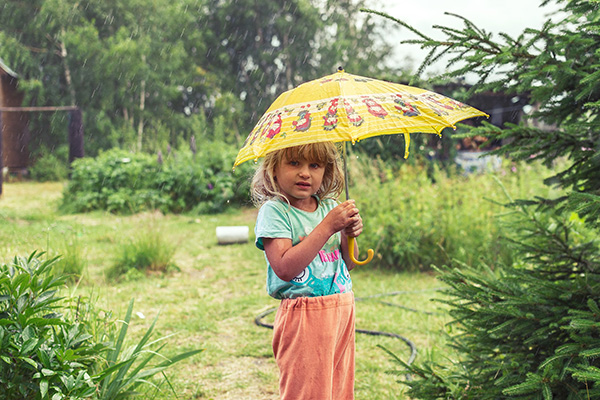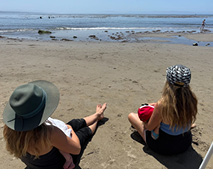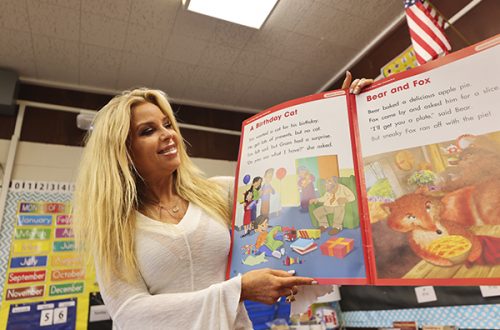Creating New Ideas for Preschools
By Jeanette Prather
Thinking outside of the box in education has become a super norm as a response to the COVID-19 pandemic. Outdoor schooling becoming more popular, more accessibility to personalized learning and governmental funding supplementing early education, to name a few of the scholastic pivots. Some preschools are taking these opportunities to continue developing their own new and alternative curriculums.
“This year, I’ve set up a classroom outside so that we can safely be together,” said Westside Parent Education Nursery School (WPENS) director and teacher Cory Cherk, who is also a 25-year veteran of the preschool co-op scene and a current parent education teacher with PVUSD. “The kids are really thriving outdoors because it’s fun.”
WPENS’ preschool curriculum maintains a learn-through-play stance with their students, stating that, “While parent education is the focus for the adult, learning through play is the work of the child.” According to wpens.org, “Children freely choose from a variety of materials and play equipment depending upon their own interest, learning style, level of readiness and mood for the day. Allowed this freedom of choice, the child’s play can be free, spontaneous, vigorous and creative.”
Says WPENS’ Board Vice President, Sarah Camp,“It’s not just about dropping your kid off so you can get a few hours to yourself. It’s about building a group of families that will be a part of your child’s life for years to come. It’s a higher level of relationship building for both kids and adults.”
Through an original approach to the preschool structure, a typical 2.5-hour class at WPENS would include free choice activities and open play, circle time, snack time, outdoor play and a goodbye circle, all facilitated by student family volunteers in collaboration with the WPENS staff. “We’re not just a preschool, we’re a whole community who raises the children collectively,” said Cherk. “It’s the parents who work in the school, know each other’s children and a way to raise them if you can. The confidence and kindness that comes from the children as a result is amazing. They feel the quality of parenting and the program.”
Alongside a growing trend for students to take their education into their own hands, seems to be educating in nature. The North American Association for Environmental Education (NAAEE) offers a nationwide alliance to help support other nature-focused early education institutions. The Natural Start Alliance believes “that hands-on experiences in nature help build stronger, smarter, and happier children, [and] that quality education for young children includes regular opportunities to connect with nature and the local environment,” according to naturalstart.org. “We also believe that as children learn to care for themselves and others, they also begin to learn to care for the world around them.”
Locally, there are two preschools associated with the Natural Start Alliance: The Santa Cruz Forest School (SCFS) and Nature’s Nursery School, the latter offering a summer-only program before the pandemic.
“We believe that Mother Nature is the best teacher, that children and adults are equals and co-learners [and] that work and play are one,” they say on thesantacruzforestschool.org. “The outdoor classroom offers engaging learning experiences that develop all of our senses. It offers open-ended materials, opportunities for imaginative play, and both large and fine motor challenges, all of which are necessary for early childhood development.”
A parent should expect their SCFS student to engage in activities like climbing, building, and crafting from the natural environment; stick-whittling; finding and naming plants, mushrooms, insects, lizards, and salamanders; participating in dramatic play and hide-and-seek; digging holes, stomping in mud and dancing in the rain; and searching for creatures in various locations.
“The best part of forest school is the forest!” said Amanda Bell, of the Forest School. “Children spend their days exploring the fairy rings, playing games in the field, visiting with the farm animals, and building a community of play with their peers.”
SCFS director and local mom, Bell, developed her passion for the outdoors as a child, and continued fostering her love for outdoors while in college and beyond.
“Being in nature is one of the best things we can do with young children. The natural environment is rich beyond what any indoor environment can provide. Our loosely-structured, child-led approach to education is anchored by caring and attentive teachers who are always on the lookout for opportunities to learn – and there are plenty of these when nature is your classroom. The best days are when the children dig into their surroundings (oftentimes literally), and get lost in the worlds they’ve created together through imaginative play.”
Discovery Preschool and Family Center applies the Reggio Emilia Approach to education. through “an innovative approach to early childhood education [we] value your child as strong and capable, rich with wonder and knowledge. It’s our mission to bring families and educators together to enrich a child’s early development and education,” says its website.
The Reggio Emilia Approach is founded upon “collegial and relations-based work for all workers; the daily presence of a plurality of educators and teachers with children; the atelier and the person of the ‘atelierista;’ in-school kitchens; the environment as educator; documentation for making creative knowledge processes visible; the pedagogical and educational practice coordinating group; and the participation of families.”
What does this all mean? The Reggio Emilia Approach is an educational philosophy that centers around children already possessing strong developmental potentials and foundational rights who learn through infinite imagination boundaries (referred to as ‘100 languages’ within the philosophy) and growing within the relation with others.
“The child is made of one hundred. The child has a hundred languages, a hundred hands, a hundred thoughts, a hundred ways of thinking, of playing, of speaking,” wrote early Reggio Emilia method pioneer, Loris Malaguzzi in a poem titled, “100 Languages – No Way. The Hundred is There.” “The school and the culture separate the head from the body. They tell the child to think without hands, to do without head, to listen and not to speak, to understand without joy, to love and to marvel only at Easter and Christmas” … “And thus, they tell the child that the hundred is not there. The child says: No way. The hundred is there.”
“My vision for the school is to foster the professional development and personal growth of our educators to become life-long learners and strong leaders in our educational community; additionally, I strive to create programs for families to feel supported and nurtured throughout the often challenging and ever-changing lives of early childhood!” Said Discovery Preschool and Family Center owner, Sara Balla. “Each day I am humbled by the strength of community, family and early childhood education created here at Discovery!”
Another approach to pioneering early education is learning a language. “We uncover children’s cognitive potential through language immersion,” writes L’Academy Preschool on its website at lacademyschools.com. “Our ultimate goal is to develop each child mindfully with love and compassion through a language-rich curriculum!”
L’Academy Preschool focuses on social compassion through the immersion of language, communication and play. “Research has shown that exposure to a second language early in life is one of the best tools for cognitive development,” the website explains. “Throughout our curriculum of meaningful activities, our children are shown pathways to become confident, creative, expressive, and compassionate citizens of the world.”
Because there are a handful of L’Academy Preschools sprawled throughout the Bay Area (one being in Santa Cruz), the curriculum varies depending on location. The Santa Cruz-based L’Academy currently offers a Spanish immersion program and focuses on promoting diversity, compassion and tolerance among different cultures.
“Learning a second language is also a great way to gain cultural awareness,” writes L’Academy Preschool. “Our ultimate goal is to develop each child mindfully with love and compassion which will ultimately make them successful citizens of society.”
L’Academy offers a preschool experience through mixed-age classrooms and project-based curriculum centering on math, science, art and/or music, depending on the size of the class.
One common thread throughout all the innovative preschools above is the harboring of a play-based and social-emotional component to their curricula. “Social and emotional awareness describes the ability to identify your own and others’ emotions, as well as to empathize with someone, even when you feel differently,” writes L’Academy Preschool. “Children’s social and emotional health affects their overall development and learning.”
“Listening is a skill we cultivate at Forest School – listening to our feelings, our friends, our bodies, and our surroundings,” writes thesantacruzforestschool.org.
“My hope for WPEN graduates, is the development of social-emotional skills, self-confidence, academic-readiness, creative thinking and lifelong friendships,” said WPENS director and teacher, Cory Cherk. “Shouldn’t we always be aiming to learn through play?” Added Sarah Camp, WPENS’ Board Vice President. “Play is the best! I hope my children can play as much as possible throughout their whole lives and that I can join them as often as possible.”
Looking for more preschool resources?
At the Santa Cruz County Office of Education, the Child Development Resource Center is dedicated to helping families find a suitable child care match or preschool program. Its bilingual services supply a variety of resources for families. It also offers many supports for preschool teachers and child care providers. Utilizing a referral database that contains all licensed preschools and child care programs in Santa Cruz County, they can work up a free listing based on your family’s needs.
“It is challenging for people to find what they want right now, mostly because of COVID but also because the supply is diminishing. We are on a mission to recruit new people to open family child care homes and run small preschool programs in their homes.”
Do you know of an unusual and interesting preschool teaching approach? Please write us about it at [email protected]








